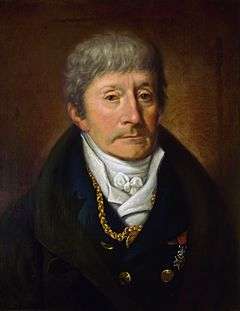La scuola de' gelosi
| Antonio Salieri |
|---|
 |
|
Operas
|
La scuola de' gelosi (The School of Jealousy)[1] is a dramma giocoso in two acts by Antonio Salieri, set to a libretto by Caterino Mazzolà.
Performance history
It was first performed at the Teatro San Moisè in Venice on 27 December 1778.[2] In 1783 it was given in Vienna, to inaugurate the reestablishment of the Italian Opera troupe. Salieri revised the score for the 1783 performances, creating new arias and expanding the role of woodwinds and brass in the scoring of the work. The cast including Francesco Benucci as Blasio and Nancy Storace as the countess, the original Figaro and Susanna in Mozart's The Marriage of Figaro. It reached London in 1786, where, as in many other European cities, it enjoyed great success. Franz Joseph Haydn composed two insertion arias for the work, one lost, the surviving aria, Dice benissimo, for bass & orchestra, H. 24b/5.
Roles
| Cast | Voice type | Premiere, 27 December 1778 (Conductor: - ) |
|---|---|---|
| Count Bandiera | tenor | |
| Countess Bandiera | soprano | |
| Blasio, a grain dealer | bass | |
| Ernestina, his wife | soprano | |
| Lumaca, Blasio's servant | bass | |
| Carlotta, a chambermaid | soprano | |
| The Lieutenant, Blasio's cousin and a friend of the count | tenor | |
Synopsis
The plot of the opera involves love intrigues, attempted seductions and provocations to jealousy between members of the three different social strata: the aristocracy, the bourgeoisie and the working class. The role of the Lieutenant is a close parallel to that of Don Alfonso in Mozart's Così fan tutte.
References
- ↑ V. Elena Biggi Parodi, "Catalogo tematico delle opere teatrali di Antonio Salieri", Lim, Lucca 2005, p. CLVIII, 957.
- ↑ V. Elena Biggi Parodi, "La fortuna della musica di Salieri in ITalia ai tempi di Mozart" in "Da Beaumarcais a Da Ponte", ed. Elena Biggi Parodi and Rudolph Angermüller, Torino, 1996, p. 41-51.
- Rice, John A.: "La scuola de' gelosi", Grove Music Online ed L. Macy (accessed 4 May 2007), grovemusic.com, subscription access.
- Rice, John A.: La scuola de' gelosi in 'The New Grove Dictionary of Opera', ed. Stanley Sadie (London, 1992) ISBN 0-333-73432-7